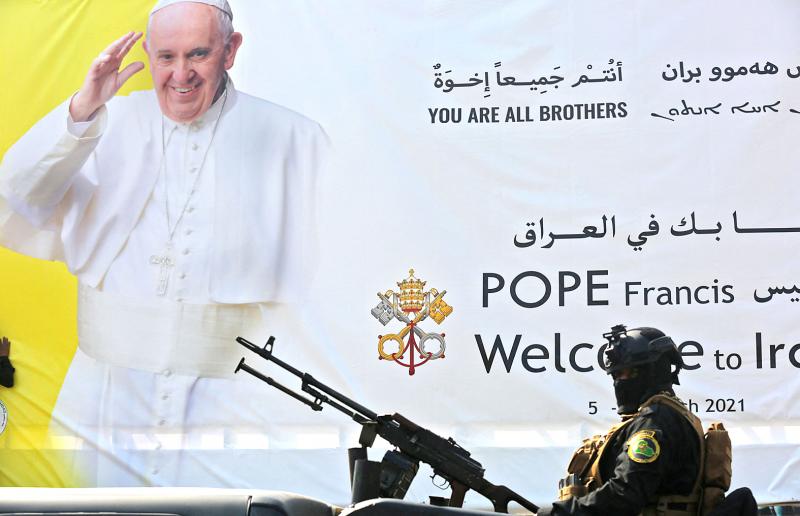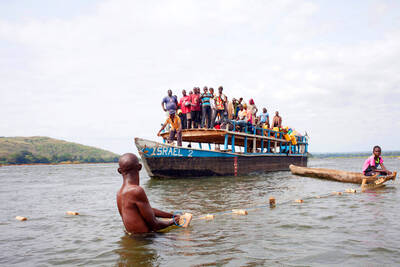Pope Francis yesterday began a historic trip to war-battered Iraq, defying security fears and the COVID-19 pandemic to comfort one of the world’s oldest and most persecuted Christian communities.
The 84-year-old, who said he was making the first-ever papal visit to Iraq as a “pilgrim of peace,” would also reach out to Shiite Muslims when he meets Iraq’s top cleric, Grand Ayatollah Ali al-Sistani.
The pope left Rome early yesterday for the four-day journey, his first abroad since the onset of the pandemic, which left the leader of the world’s 1.3 billion Catholics saying he felt “caged” inside the Vatican.

Photo: AFP
While Francis has been vaccinated, Iraq has been gripped by a second wave with a record of more than 5,000 new cases per day, prompting authorities to impose full lockdowns during the pontiff’s visit.
Security would be tight in Iraq, which has endured years of war and insurgency, is still hunting for Islamic State sleeper cells, and days ago saw a barrage of rockets plough into a military base.
Francis would preside over a half-dozen services in ravaged churches, refurbished stadiums and remote desert locations, where attendance would be limited to allow for social distancing.
Inside the country, he would travel more than 1,400km by plane and helicopter, flying over areas where security forces are still battling Islamic State remnants.
For shorter trips, Francis would take an armored vehicle on freshly paved roads that would be lined with flowers and posters welcoming the leader known here as “Baba al-Vatican.”
The pope’s visit has deeply touched Iraq’s Christians, whose numbers have collapsed over years of persecution and sectarian violence, from 1.5 million in 2003 to fewer than 400,000 today.
“We’re hoping the pope will explain to the government that it needs to help its people,” said a Christian from Iraq’s north, Saad al-Rassam. “We have suffered so much, we need the support.”
The first day of the pope’s ambitious itinerary would see him meet government officials and clerics in the capital Baghdad, including at the Our Lady of Salvation church, where a jihadist attack left dozens dead in 2010.
He would also visit the northern province of Nineveh, where in 2014 militants forced minorities to flee, convert to Islam or be put to death.
“People had only a few minutes to decide if they wanted to leave or be decapitated,” said Karam Qacha, a Chaldean Catholic priest in Nineveh. “We left everything — except our faith.”
About 100,000 Christians — about half of those who lived in the province — fled, of whom just 36,000 have returned, according to Catholic charity Aid to the Church in Need.
Among the returnees, a third have said they want to leave again in coming years, dismayed by Iraq’s rampant corruption, persecution and poverty, which affects 40 percent of the population.
The exodus is a loss for all of Iraq, said Cardinal Leonardo Sandri, who heads the Vatican’s Congregation for the Oriental Churches and would accompany the pope to Iraq.
“A Middle East without Christians is like trying to make bread with flour, but no yeast or salt,” he said.
The visit aims to encourage Christians to stay in their homeland, and prompt some emigres to return from nearby Lebanon and Jordan, or further afield like Canada and Australia.
In a video address ahead of the trip, Francis evoked “the wounds of loved ones left behind and homes abandoned,” saying there had been “too many martyrs” in Iraq.
“I come as a pilgrim, a penitent pilgrim to implore forgiveness and reconciliation from the Lord after years of war and terrorism,” he said.
The pope has insisted on the visit despite resurging violence.
Rocket attacks across the country have left three people dead in the past few weeks, including a US contractor who died on Wednesday.
Francis’ determination to travel to areas long shunned by foreign dignitaries has impressed many in Iraq — as has his planned meeting with al-Sistani, 90, the top authority for Iraq’s Shiites.
A highly reclusive figure who rarely accepts visitors, al-Sistani would make an exception to host Francis at his home in the shrine city of Najaf today.
Banners around Najaf have celebrated “the historic encounter, between the minarets and the church bells.”

‘IN A DIFFERENT PLACE’: The envoy first visited Shanghai, where he attended a Chinese basketball playoff match, and is to meet top officials in Beijing tomorrow US Secretary of State Antony Blinken yesterday arrived in China on his second visit in a year as the US ramps up pressure on its rival over its support for Russia while also seeking to manage tensions with Beijing. The US diplomat tomorrow is to meet China’s top brass in Beijing, where he is also expected to plead for restraint as Taiwan inaugurates president-elect William Lai (賴清德), and to raise US concerns on Chinese trade practices. However, Blinken is also seeking to stabilize ties, with tensions between the world’s two largest economies easing since his previous visit in June last year. At the

UNSETTLING IMAGES: The scene took place in front of TV crews covering the Trump trial, with a CNN anchor calling it an ‘emotional and unbelievably disturbing moment’ A man who doused himself in an accelerant and set himself on fire outside the courthouse where former US president Donald Trump is on trial has died, police said yesterday. The New York City Police Department (NYPD) said the man was declared dead by staff at an area hospital. The man was in Collect Pond Park at about 1:30pm on Friday when he took out pamphlets espousing conspiracy theories, tossed them around, then doused himself in an accelerant and set himself on fire, officials and witnesses said. A large number of police officers were nearby when it happened. Some officers and bystanders rushed

Beijing is continuing to commit genocide and crimes against humanity against Uyghurs and other Muslim minorities in its western Xinjiang province, U.S. Secretary of State Antony Blinken said in a report published on Monday, ahead of his planned visit to China this week. The State Department’s annual human rights report, which documents abuses recorded all over the world during the previous calendar year, repeated language from previous years on the treatment of Muslims in Xinjiang, but the publication raises the issue ahead of delicate talks, including on the war in Ukraine and global trade, between the top U.S. diplomat and Chinese

RIVER TRAGEDY: Local fishers and residents helped rescue people after the vessel capsized, while motorbike taxis evacuated some of the injured At least 58 people going to a funeral died after their overloaded river boat capsized in the Central African Republic’s (CAR) capital, Bangui, the head of civil protection said on Saturday. “We were able to extract 58 lifeless bodies,” Thomas Djimasse told Radio Guira. “We don’t know the total number of people who are underwater. According to witnesses and videos on social media, the wooden boat was carrying more than 300 people — some standing and others perched on wooden structures — when it sank on the Mpoko River on Friday. The vessel was heading to the funeral of a village chief in